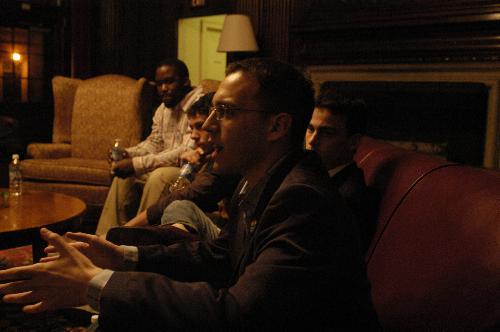
News
Summers Will Not Finish Semester of Teaching as Harvard Investigates Epstein Ties

News
Harvard College Students Report Favoring Divestment from Israel in HUA Survey

News
‘He Should Resign’: Harvard Undergrads Take Hard Line Against Summers Over Epstein Scandal

News
Harvard To Launch New Investigation Into Epstein’s Ties to Summers, Other University Affiliates

News
Harvard Students To Vote on Divestment From Israel in Inaugural HUA Election Survey
Male Panel Takes Back the Night

A panel of male undergraduate leaders spoke yesterday about sexual assault, stressing the universality of the issue as part of Harvard’s annual Take Back the Night (TBTN) week.
“Rape is a problem that has no gender ownership,” said Theodore B. Bressman ’06, a peer counselor for the Office of Sexual Assault and Prevention Response.
The purpose of the event was to offer a “tangible presentation of men combating sexual and domestic violence,” TBTN Co-chair Vanessa V. Pratt ’08 said. “So it’s not always how men are making violence, it’s how men are stopping the violence as well.”
While the event was billed as the men’s portion of TBTN, the audience of about 30 was predominantly female.
A good portion of the panel discussion dealt with how to increase male participation in what has traditionally been perceived as a woman’s issue.
Held in the Kirkland House Junior Common Room, the event featured desserts and pizza.
The panel was comprised of “men who provide examples of a diversity of male activism,” Pratt said. Undergraduate Council President John S. Haddock ’07 and former Black Men’s Forum (BMF) President Kwame Owusu-Kesse ’06 were among the participants.
The event included a question-and-answer session followed by an open discussion amongst the audience and panelists.
Each panelist also offered his own perspective on the universal relevance of sexual violence prevention.
UC Student Activities Committee Vice-Chair Matthew R. Greenfield ’08 said that he became active in TBTN after the rape of a female friend. Joshua D. Smith ’08 said that many males are also victims of rape but shame often prevents them from reporting it.
The panel also confronted the taboos that discourage men from taking a more active stance in preventing sexual violence.
“The basic assumption is that the reason you’re there is because you’re a victim, close to a victim, or a former perpetrator,” Greenfield said.
One male audience member pointed out that the discussion of rape can often feel like an accusation against all men. “There are aspects of an anti-rape or anti-violence movement that tends to paint all men in a negative light,” he said.
After the event, audience member and BMF President Tracy “Ty” Moore II ’06, said that he thought the event was “phenomenal” because it brought both genders together to discuss sexual violence from the male perspective.
“This is important to men on this campus,” Moore said, “I think this community is empowering, and I’m excited to see more events of this type.”
Want to keep up with breaking news? Subscribe to our email newsletter.
